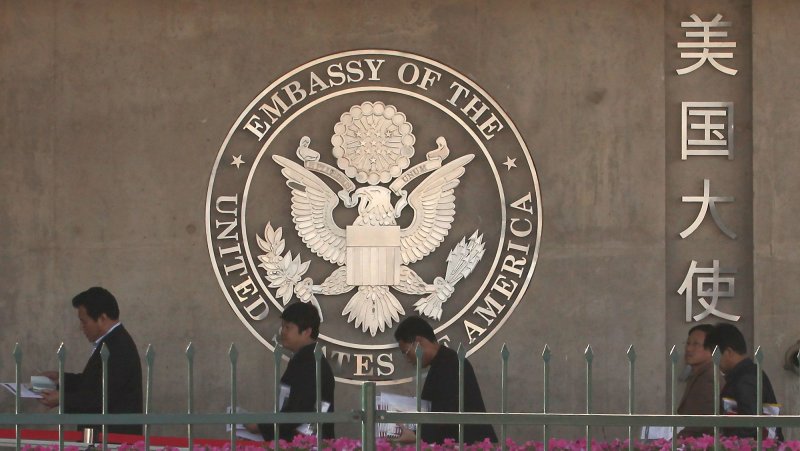Chinese hoping to obtain visas to the United States enter the U.S. embassy's visa section in Beijing. Experts are increasingly looking to expand visa verification to help curb immigrants overstaying their visas. UPI/Stephen shaver |
License Photo
HOUSTON, Sept. 4 (UPI Next) --
Although how to handle people entering the United States illegally is a prominent national political issue, immigration experts tell UPI Next that border enforcement is only half the battle, with legal immigrants overstaying their visas also a significant problem.
A flood of once-legal visitors who have stayed past the expiration of their visas has become a large group of illegal immigrants, Gary Freeman, an immigration law expert and University of Texas government professor, told UPI Next.
"Without a strict visa patrol service, the U.S. will experience another rise in illegal immigrant population," he said.
"You need to take notice of someone who comes in on a 60-day visa. There needs to be some form of mechanism to get that person removed.”
Freeman and others advocate a system to weed out the estimated 11 million to 12 million illegal visitors, primarily through the workplace.
Experts are increasingly looking to expand visa verification, possibly through use of facial recognition technology and other forms of biometric measurement. Limited versions of visa verification are already in use in many types of work that attract illegal entrants, including restaurants and the construction industry. The information would be sent to Washington where the Homeland Security Department or another federal agency could screen for offenders.
Doris Meissner, U.S. immigration policy director at the Migration Policy Institute, a Washington research organization, described widespread identification efforts as a useful deterrent to immigrants over-staying their visas.
"If [visa verification] becomes mandatory, then you have a much more effective and across-the-board deterrent because it'll be incredibly difficult for them to get jobs," she told UPI Next. Meissner added, though, that the technology has not yet been developed to handle heavily trafficked checkpoints and would reduce commerce along the U.S.-Mexican border because it would slow everything down.
Rep. Henry Cuellar, D-Texas, whose district includes Laredo, told UPI Next he supports a biometric system of visa verification. However, he is opposed to legislation that would hamper commerce at the border. Cuellar said retail and other commerce generate an annual $1.2 million in his district -- 45 percent of that in Laredo. That money is important to Laredo's economy, he said, adding that a slowdown in traffic would also affect sales.
The Pew Research Center, a non-partisan think tank in Washington that tracks demographic data, estimated 11 million illegal immigrants were in the United States in 2011. The number peaked in 2007, at 12 million, after a steady, seven-year climb from 8.4 million in 2000. The southwestern border alone experienced a 9 percent increase in apprehensions of illegal immigrants from 2011 to 2012.
The U.S. Border Patrol has recruited record numbers of patrol agents since 2004 to expand its presence on the southern border. By 2012, 21,300 Border Patrol agents were deployed along the southern border.
Freeman acknowledges objections to the biometric component of the verification entry/exit system, but argues the money already being spent on technology, surveillance, aircraft, fences and other materials to improve border control has had relatively small effect on securing the border.
"To try to seal it is unrealistic and too expensive, and would militarize that area," he said. "The money they're spending on the border could be better spent on [a biometric system] and implementing it across the country.
"The border is half the problem, overstaying their visas is the other half.”















